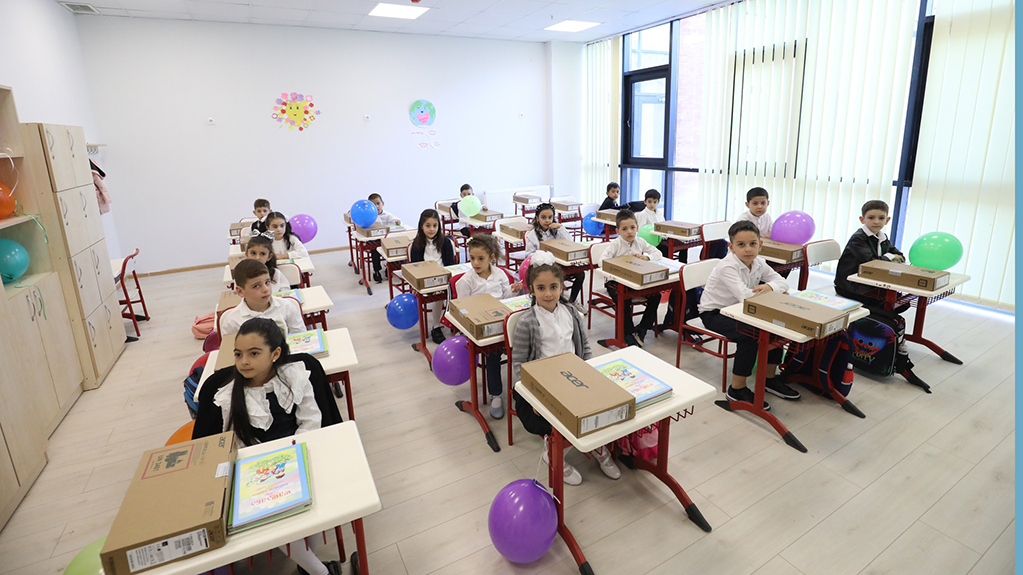Tsalenjikha Municipality City Hall will implement the nutrition program for first graders. 220 thousand GEL is provided for the program in the local budget of 2023. Meals for 300 first-graders of 30 public schools of the municipality will be funded with 4 GEL per day, which is 10 Tetri less than the amount provided for feeding children in Tsalenjikha kindergartens. The implementation of the program will start on February 1, 2023.
News
In order to be included in the program, the parent of a first grader must submit to the City Hall the following: an application, the first grader’s birth certificate, and a notice from the school about studying in the first grade.
Tamar Belkania, Deputy Mayor of Tsalenjikha Municipality, told Georgian News that bank cards will be distributed to the children, which they can use to buy products in school cafeterias and local stores. ATM withdrawal or online payment services for the card will be limited. Out of 30 public schools of Tsalenjikha Municipality, only six schools have a food block.
“Children in kindergartens are provided with food. A child gets enough calories necessary for development, but the nutrition program does not work at the next stage. When the child enters the first grade, the nutrition program does not work. The parent often can’t afford 3- 4 GEL daily, which is definitely needed for food during school. An organism accustomed to kindergarten nutrition remains without guaranteed food at school. This will naturally hinder both the mental and bone cartilage development of the child and its growth process. Tsalenjikha Municipality made a decision to implement the program for first-graders based on the best interests of children and the created social background. This program is unprecedented throughout Georgia”, says Giorgi Kharchilava, mayor of Tsalenjikha municipality.
Tsalenjikha is the only municipality in Georgia managed by the coalition government after the local self-government elections on October 2, 2021, and the mayor is a representative of the opposition party.
The 2023 budget of Tsalenjikha Municipality is currently 14,444,100 GEL. 4,584,500 GEL is used for local government maintenance. 735,000 GEL for road infrastructure development; 158,400 GEL for the development of the water system; 585,000 GEL for outdoor lighting; 329,200 GEL for improvement measures; 1,211,600 GEL for environmental protection and cleaning; 2,600,000 GEL is provided for pre-school education financing; 755,000 GEL for promotion of sports development; 870,000 GEL for the development of culture; 1,835,400 GEL for health protection and social security of the population; 375,000 GEL for providing food for the socially vulnerable people.
According to UNICEF data from 2019, almost every fourth child in Georgia (24.4%) lives in poverty. 77% of surveyed students say that they sometimes (42%) or permanently (35%) feel hungry when they come to school, which directly affects students’ low results in literacy.
According to the policy document “Needs and prospects for establishing school feeding system in Georgia,” by 2021, 189,690 children under 18 with socially vulnerable status lived in the country. Malnutrition in all forms places the most significant burden on children and adolescents in poor and marginalized communities.
According to a study by the United Nations Children’s Fund (UNICEF), an important issue is the lack of micronutrients such as iron and iodine in adolescents, which causes problems with their growth, development, and anemia.
According to the international experience of school feeding programs, the school feeding model implies the daily provision of ready meals to students at a fixed time (mainly breakfast and/or lunch). This model requires appropriate kitchen equipment for food preparation in schools or an organized supply of ready-to-eat meals. Fortified food - food enriched with vitamins and minerals. It is mostly found in the form of snacks, e.g., Fortified biscuits. Take-home Meals - The frequency of food delivery is case-by-case, usually involving monthly or seasonal food delivery to the student (and then consumption at home). Another form of food model is the lunch box - daily food provided by a third party (e.g., a parent), Contains a pre-prepared meal. The homegrown school meal model offers students food using local products, which are provided by local entrepreneurs. Micronutrient powder - a dosed sachet containing a powder saturated with dry micronutrients. The powder contains up to 15 micronutrients that can be added to the ready meal. It is essential to determine the dose according to the age of the students. This is one of the simplest methods recommended by the World Health Organization that has been successfully used in various countries. This model is especially effective in cases of nutrient deficiency in students, for example, against anemia.
Different countries' programs analysis shows that the average amount allocated per student for the entire year is $91. This number is $42 in low-income countries, $124 in middle-income countries, and $242 in developed economies. In Tsalenjikha municipality, this figure is approximately $13.3.















